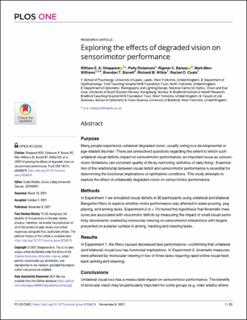| dc.contributor.author | Sheppard, William E. A. | |
| dc.contributor.author | Dickerson, Polly | |
| dc.contributor.author | Baraas, Rigmor C. | |
| dc.contributor.author | Mon-Williams, Mark | |
| dc.contributor.author | Barrett, Brendan T. | |
| dc.contributor.author | Wilkie, Richard M. | |
| dc.contributor.author | Coats, Rachel O. | |
| dc.date.accessioned | 2022-02-14T12:47:51Z | |
| dc.date.available | 2022-02-14T12:47:51Z | |
| dc.date.created | 2021-11-23T14:30:33Z | |
| dc.date.issued | 2021 | |
| dc.identifier.citation | Sheppard, W. E. A., Dickerson, P., Baraas, R. C., Mon-Williams, M., Barrett, B. T., Wilkie, R. M. & Coats, R. O. (2021). Exploring the effects of degraded vision on sensorimotor performance. PLoS One, 16(11), Artikkel e0258678. | en_US |
| dc.identifier.issn | 1932-6203 | |
| dc.identifier.uri | https://hdl.handle.net/11250/2978803 | |
| dc.description.abstract | Purpose: Many people experience unilateral degraded vision, usually owing to a developmental or age-related disorder. There are unresolved questions regarding the extent to which such unilateral visual deficits impact on sensorimotor performance; an important issue as sensorimotor limitations can constrain quality of life by restricting ‘activities of daily living’. Examination of the relationship between visual deficit and sensorimotor performance is essential for determining the functional implications of ophthalmic conditions. This study attempts to explore the effect of unilaterally degraded vision on sensorimotor performance.
Methods: In Experiment 1 we simulated visual deficits in 30 participants using unilateral and bilateral Bangerter filters to explore whether motor performance was affected in water pouring, peg placing, and aiming tasks. Experiment 2 (n = 74) tested the hypothesis that kinematic measures are associated with visuomotor deficits by measuring the impact of small visual sensitivity decrements created by monocular viewing on sensorimotor interactions with targets presented on a planar surface in aiming, tracking and steering tasks.
Results: In Experiment 1, the filters caused decreased task performance—confirming that unilateral (and bilateral) visual loss has functional implications. In Experiment 2, kinematic measures were affected by monocular viewing in two of three tasks requiring rapid online visual feedback (aiming and steering).
Conclusions: Unilateral visual loss has a measurable impact on sensorimotor performance. The benefits of binocular vision may be particularly important for some groups (e.g. older adults) where an inability to complete sensorimotor tasks may necessitate assisted living. There is an urgent need to develop rigorous kinematic approaches to the quantification of the functional impact of unilaterally degraded vision and of the benefits associated with treatments for unilateral ophthalmic conditions to enable informed decisions around treatment. | en_US |
| dc.language.iso | eng | en_US |
| dc.rights | Navngivelse 4.0 Internasjonal | * |
| dc.rights.uri | http://creativecommons.org/licenses/by/4.0/deed.no | * |
| dc.title | Exploring the effects of degraded vision on sensorimotor performance | en_US |
| dc.type | Peer reviewed | en_US |
| dc.type | Journal article | en_US |
| dc.description.version | publishedVersion | en_US |
| dc.rights.holder | © 2021 Sheppard et al. | en_US |
| dc.source.volume | 16 | en_US |
| dc.source.journal | PLOS ONE | en_US |
| dc.source.issue | 11 | en_US |
| dc.identifier.doi | https://doi.org/10.1371/journal.pone.0258678 | |
| dc.identifier.cristin | 1957887 | |
| dc.source.articlenumber | e0258678 | en_US |
| cristin.ispublished | true | |
| cristin.fulltext | original | |
| cristin.qualitycode | 1 | |

